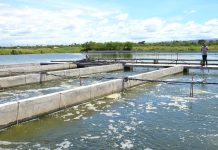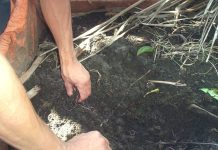“The youth is the hope of the fatherland,” said the country’s national hero Jose P. Rizal.
Moncini “Muneer” Hinay thinks so, too. He is the president and co-founder of Kids Who Farm Sustainable Food Systems, Inc. or Kids Who Farm (KWF), a Zamboanga City-based organization that aims to inspire future farmers by educating the youth on the importance and value of food and farming.
“Our main target audience are mainly the youth,” said Hinay, who’s actually from Butuan City. “Our mission is to provide a platform for them to participate in local food security solutions. In the process, we also engage children because our programs involve collaboration with schools and primary educational institutions.”
KWF is the brainchild of his daughter, Raaina Hinay, who came up with the idea when she was only 9 years old in 2019. Automatically, she’s the other co-founder. “She wanted to help her school garden in Catalina Vda De Jalon Memorial School in barangay Tumaga,” he recalled.
Her gesture inspired the father to establish KWF as an advocacy initiative first and later as a non-profit startup organization. The core team is composed of proactive youth volunteers, young professionals, and community leaders in the city.
“Our vision is to reverse the persistent trend of aging Filipino farmers by building the expertise of the youth in agriculture and creating urban green jobs incubation opportunities to engage them in the business of farming to secure food for the future,” he explained.
Getting young people to farm
Hinay further pointed out, “We believe that the future of food security depends on the anticipated participation of young people in food and farming, that’s why we engage the youth in meaningful and impact-driven community food security initiatives.”
Right now, the average age of Filipino farmers ranges from 55 years old to 59 years old, according to some studies. Experts predict the country will face a critical shortage of farmers in 10 to 12 years.
“There is an urgent need to inspire future farmers and make sure that our youth are trained and equipped to engage in food and farming as well cultivate food citizenship among the youth,” Hinay said. “We need more than ever young people who are aware of the impacts of their food choices on the planet, society and economy and have empathy towards food.”

Involvement of schools
To accomplish these objectives, KWF teaches children urban container gardening, hydroponics, composting, agro-entrepreneurship, and financial literacy in tandem with both public and private schools. Teachers and parents are also involved by collaborating with them through the General Parents-Teacher Associations.
KWF teaches and trains vegetable gardening, which is one way to beat malnutrition among kids. The vegetables to plant are dependent upon the needs of the community. “Most of the starter crops are leafy vegetables like pechay, mustard, kangkong, lettuce and indigenous veggies like talinum and alugbati. We also recommend pinakbet crops like squash, eggplant, and string beans. These are mostly what they consume and what the community needs,” Hinay said.
As an organization, KWF follows some core values like respect (“we treat all people with dignity and respect”), integrity (“upholding the highest moral principles at all times”), and volunteerism (“providing time, energy, and resources to assist, empower and sustain communities”).
KWF also encourages creativity and innovation. “We are continuously looking for new, creative and innovative solutions and encourage the ideas of others so that we can adapt and succeed in an ever-changing and climate-defined global environment,” Hinay said.
Another core value KWF instills in its members is inclusiveness. “We provide equal access to opportunities and resources for people regardless of age, gender, social status, religion, political views, and background,” he said.
Core programs
One of KWF’s core programs is Hyperlocal Food Network. “This program aims to establish youth-led community gardens and school microfarms so that food-secure future cities will be realized,” Hinay said. “We also want to empower the youth as the next generation of food producers by building their expertise in food and farming through capacity development interventions and community involvement.”
So far, KWF has established 40 community food gardens and school microfarms in 25 barangays in Zamboanga City, two in Cagayan de Oro City, one in Bongao, Tawi-Tawi, 6 in Bukidnon, and 3 in Davao City. “We have mobilized 180 youth volunteers in community microfarm establishment and trained over 6,000 individuals in urban agriculture technologies.”
Another core program KWF promotes is Kids Can Compost. This flagship program aims to tackle the pressing issue of food waste and provide circular solutions. “We advocate doable and replicable technology solutions to managing and reducing food waste through education, information campaigns, and introduction of the food loop home-based food production system. We also engage local partners and communities in composting technologies.
KWF is looking forward that by 2025, 50% of the households in Zamboanga City to have its own circular food loop using the so-called Gardenator technology in composting household food waste and hyperlocal food production. By doing so, food waste disposal in the landfills will be significantly reduced.
Still another important initiative is the Hyperlokal Kapital Community Savings Club (CSC). “Formal financial institutions are not always able to meet the needs of many Filipinos, particularly marginalized communities and sectors who live in remote areas,” Hinay said. “Nonetheless, everyone including the youth needs financial literacy, access to small amounts of savings and loans to help them improve their incomes, make timely investments and cope with emergencies.”
Hinay sees CSC as one possible solution. “The CSC is the first step to financial inclusion as it provides a mechanism to save money while building financial knowledge and skills,” he said.
A CSC is a community-based, self-managed and independent group that mobilizes and manages its own savings through purchasing shares and taking small loans from those savings. The activities run in cycles for one year, after which the accumulated savings and the loan profits are distributed back to the members in proportion to their savings.
The KWF has organized 18 CSCs in Zamboanga City, Bulacan, Manila and Cavite, mobilizing a total of 1,500,000 worth of savings for hyperlocal access to capital for livelihood activities and personal planned expenses.
KWF has produced some modules for these core programs. “We shared our training modules to schools so that they can adopt and make the learning program a part of the subject,” Hinay said.
He cited the case in Davao City, where KWF works with the Holy Child College of Davao. “We trained the students on urban agriculture technologies and after the training they established their microfarm as a learning site for the students. We also encouraged them to implement gardening in their respective homes after they learned from the training,” he said.
“For the youth, the training is aimed at equipping them to be competent volunteers who will also train community residents in our partner barangays and communities,” Hinay added.
Currently, KWF has a partnership with the Global Shapers Davao to establish a school microfarm and train elementary children at San Roque Central Elementary School in Barrio Obrero of Davao City.
Funding and recognitions
KWF gets its financial sustenance from corporate partners, crowdfunding or donations, logistic support from the Department of Agriculture, and consultancies. It also participates in hackathons and grant competitions.
Through the years, KWF has received several citations and recognitions. In 2020, KWF received the Conservation Hero Award from the World-Wide Fund for Nature-Philippines and the Social Innovator of the Social Innovation Challenge from iVolunteer Philippines.
In 2021, KWF got three awards, including the Grand Prize from the Philippine Development Foundation and Cebuana Lhuillier Foundation Financial Literacy Innovation Challenge for its CSC initiative.
In 2022, the Agriculture Magazine of Manila Bulletin bestowed the father and daughter tandem the UPLIFT Award. “The father-daughter urban agriculture advocates believe, ‘It’s never too young to make a difference,’” the magazine said.
This year, KWF received a Resolution and Commendation from the Sangguniang Panlungsod of Zamboanga City and the Green Impact Accelerator from the U.S. Embassy of the Philippines, American Spaces Philippines, and the Spark Project.
When asked about their future plans, Hinay said, “Our plan is to expand our scope and reach to more cities and communities in Mindanao while continuously establishing strategic partnerships and collaboration with the government and the private sector so we can empower more young people and create positive community impact.” –







